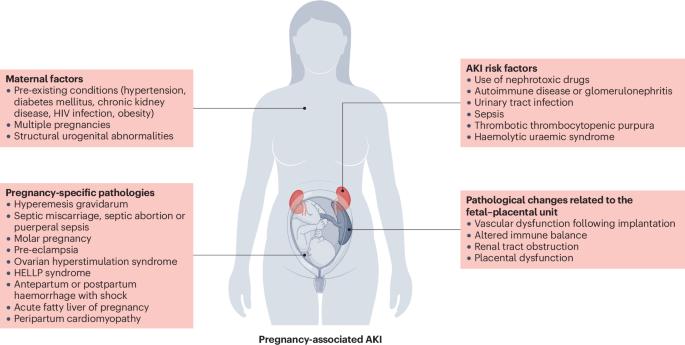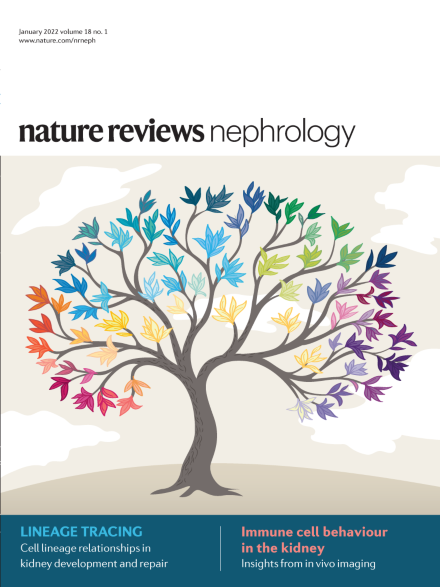妊娠相关急性肾损伤——第32届急性疾病质量倡议工作组共识报告
IF 39.8
1区 医学
Q1 UROLOGY & NEPHROLOGY
引用次数: 0
摘要
妊娠期和产后急性肾损伤(AKI),又称妊娠相关性AKI (PrAKI),是一个重要的健康问题,也是全球卫生不平等的驱动因素。PrAKI的病因包括败血症、自身免疫性疾病和妊娠特异性病理,如高血压疾病。常见的危险因素包括产妇合并症和使用肾毒性药物。PrAKI在孕产妇死亡率和发病率中占很大比例,特别是在低收入和中等收入国家,还可能对胎儿产生不利影响,导致死亡、早产和胎龄小。在本共识声明中,我们提出了来自第32届急性疾病质量倡议会议的关于PrAKI的病因、诊断、管理和随访的建议,该会议涉及产科、助产学、产科医学、儿科、内科、麻醉学、肾脏病学和重症监护方面的国际专家。我们建议应确定PrAKI高危孕妇和产后妇女,以便进行预防、监测和及时诊断。这些患者的多学科管理应量身定制,以治疗其PrAKI的具体原因,以优化短期和长期的新生儿和孕产妇结局。需要进一步的观察性和介入性研究来解决PrAKI知识的现有空白,并改善孕产妇和胎儿的结局。本文章由计算机程序翻译,如有差异,请以英文原文为准。


Pregnancy-associated acute kidney injury — consensus report of the 32nd Acute Disease Quality Initiative workgroup
Acute kidney injury (AKI) during pregnancy and the postpartum period, known as pregnancy-associated AKI (PrAKI), is an important health concern and driver of health inequity worldwide. Causes of PrAKI include sepsis, autoimmune disorders and pregnancy-specific pathologies such as hypertensive disorders. Common risk factors include maternal comorbidities and use of nephrotoxic medications. PrAKI accounts for a substantial proportion of maternal mortality and morbidity, particularly in low-income and middle-income countries, and may also adversely affect the fetus, resulting in death, premature birth and small for gestational age. In this Consensus Statement, we present recommendations on the causes, diagnosis, management and follow-up of PrAKI from the 32nd Acute Disease Quality Initiative meeting, which involved international experts in obstetrics, midwifery, obstetric medicine, paediatrics, internal medicine, anaesthesiology, nephrology and critical care. We suggest that pregnant and postpartum women at a high risk of PrAKI should be identified to enable prevention, surveillance and timely diagnosis. The multidisciplinary management of these patients should be tailored to treat their specific causes of PrAKI to optimize short-term and long-term neonatal and maternal outcomes. Further observational and interventional studies are needed to address existing gaps in knowledge of PrAKI and improve maternal and fetal outcomes. Pregnancy-associated acute kidney injury is a risk factor for maternal and fetal morbidity and mortality and a driver of health inequity worldwide. This Consensus Statement from the Acute Disease Quality Initiative provides recommendations on the causes, diagnosis, management and follow-up of pregnancy-associated acute kidney injury.
求助全文
通过发布文献求助,成功后即可免费获取论文全文。
去求助
来源期刊

Nature Reviews Nephrology
医学-泌尿学与肾脏学
CiteScore
39.00
自引率
1.20%
发文量
127
审稿时长
6-12 weeks
期刊介绍:
Nature Reviews Nephrology aims to be the premier source of reviews and commentaries for the scientific communities it serves.
It strives to publish authoritative, accessible articles.
Articles are enhanced with clearly understandable figures, tables, and other display items.
Nature Reviews Nephrology publishes Research Highlights, News & Views, Comments, Reviews, Perspectives, and Consensus Statements.
The content is relevant to nephrologists and basic science researchers.
The broad scope of the journal ensures that the work reaches the widest possible audience.
 求助内容:
求助内容: 应助结果提醒方式:
应助结果提醒方式:


